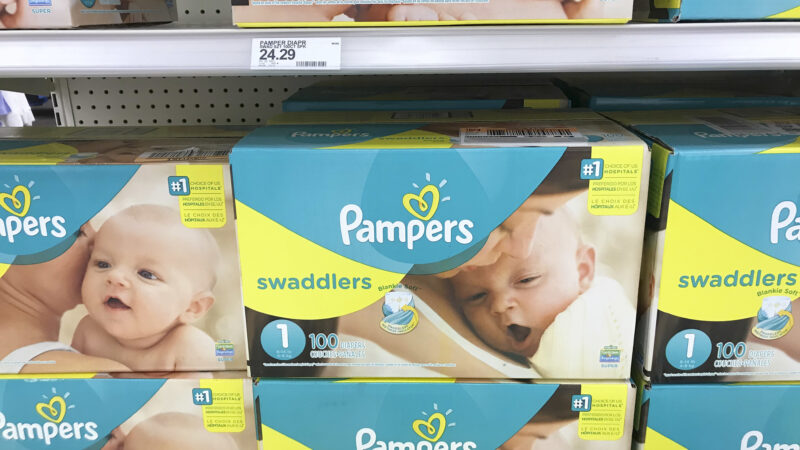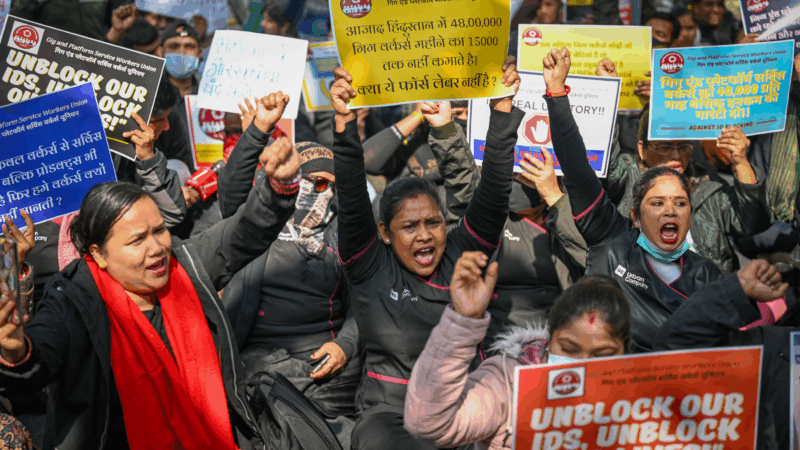A medical equipment company is trying to turn the tide on the Gulf South’s ‘diaper divide’
Procter & Gamble's Pampers diapers fill shelves on Thursday, June 14, 2018, in Aventura, Fla. (AP Photo/Brynn Anderson)
Both the cost and the demand for diapers shot up during the pandemic, exacerbating what’s known as the “diaper divide” for both parents and people who experience incontinence.
Aeroflow Healthcare, a North Carolina-based provider of durable medical equipment (DME) and services, has been working to alleviate some of the cost through legislation, urging state governments in the Gulf South to eliminate sales tax on these supplies.
Ryan Bullock, Aeroflow’s chief operations officer, said the company surveyed families who cared for someone needing diapers or other supplies and found that many had to choose between having clean diapers or having food and paying bills.
“The diaper divide is not just for children. It’s for adults as well,” Bullock said. “There’s parents, grandparents, neighbors — people that you wouldn’t suspect that have incontinence needs — but they’re not able to get that need met.”
During Louisiana’s recent legislative session, Aeroflow supported a bill that would change the definition of diapers to include other incontinence supplies, not just for children, making a sales tax removal more inclusive. The bill was debated on the state House floor twice, but no action was taken during the session.
Louisiana used to have a sales tax exemption on breast pumps and other nursing supplies, but it’s currently suspended until 2025. Getting rid of the sales tax would cost the state money, but Bullock said it could potentially save families hundreds of dollars a year.
“It’s really a very small percentage as compared to the impact that it has on the consumer that is needing access to those products, and what that really means to them and their daily life,” he said.
Aeroflow successfully championed a diaper tax bill that passed in Texas in July. Starting September 1, diapers, breast pumps and other incontinence products will be tax-free. The company plans to continue its efforts in Louisiana in 2024 and is also making Mississippi a high priority.
This story was produced by the Gulf States Newsroom, a collaboration between Mississippi Public Broadcasting, WBHM in Alabama, WWNO and WRKF in Louisiana and NPR. Support for reproductive health coverage comes from The Commonwealth Fund.
Gothic lust, chair lust and big-league dreams are in theaters this weekend
A fever-dream of a "Wuthering Heights" adaptation is out this weekend starring Margot Robbie and Jacob Elordi. And Stephen Curry-produced GOAT is a speedy, snazzily animated sports flick.
Camp Mystic parents from Alabama seek stronger camp regulations
Sarah Marsh of Birmingham, Ala. was one of 27 Camp Mystic campers and counselors swept to their deaths when floodwaters engulfed cabins at the Texas camp on July 4, 2025. Sarah’s parents are urging lawmakers in Alabama and elsewhere to tighten regulations.
Court rebuffs plea from domestic workers for better pay and respect
They're often paid low wages and lack job protections. A petition to the country's supreme court to support their demands did not see success — and they are protesting.
Spy agency says Kim Jong Un’s daughter is close to be North Korea’s future leader
Seoul's assessment comes as North Korea is preparing to hold its biggest political conference later this month, where Kim is expected to outline his major policy goals for the next five years.
Using GLP-1s to maintain a normal weight? There are benefits and risks
Drugs like Zepbound and Wegovy are intended for people who are overweight. Some patients are using them after bariatric surgery to keep pounds from creeping back. Others may just want to lose a few pounds.
Jordan Stolz opens his bid for 4 golds by winning the 1,000 meters in speedskating
Stolz received his gold for winning the men's 1,000 meters at the Milan Cortina Games in an Olympic-record time thanks to a blistering closing stretch. Now Stolz will hope to add to his collection of trophies.








